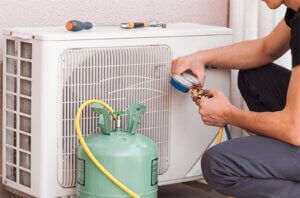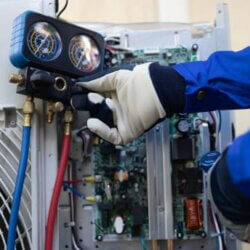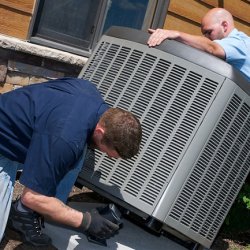Refrigerant is, without a doubt, the most important component of your air conditioning system. Also called coolant, it is a chemical compound that absorbs heat from the air indoors and expels it outdoors. By removing the heat, it cools the air indoors keeping your home comfortable during the hot summer days. Refrigerants are used in both ductless and ducted air conditioning systems. However, if your AC is not cooling as it should, it could be because of AC refrigerant leaks.
Refrigerant leaks in your AC not only hamper the cooling capacity of your air conditioning unit but also increases your energy bills because your AC has to work harder.

To learn more about how to locate and repair AC refrigerant leaks, contact the experts at Galmiche & Sons. Serving St. Louis since 1950 with dependable heating and air conditioning services, you can trust us for all your AC repair needs.
Why Are AC Refrigerant Leaks Bad?
In older air conditioners, AC refrigerants are usually Freon, which is a tasteless and odorless gas. AC refrigerant leaks could negatively impact both your health and the environment. It can also damage your HVAC unit. A freon leak is a health hazard. Prolonged exposure could lead to refrigerant poisoning. The symptoms include dizziness, headache, nausea, vomiting, coughing, and eye, ear, and nose irritation.
Even if your AC uses a newer, more environmentally friendly refrigerant, air conditioner refrigerant leaks can also severely hamper your AC’s performance. If your unit has to work harder to maintain the indoor temperature, it could even lead to compressor failure or other air conditioner breakdowns in the long run.
How Do You Identify Refrigerant Leaks?

If your AC’s performance has taken a hit lately and it takes longer for it to cool your house, the reason could be a leaks. Here are a few common signs of AC refrigerant leaks you should be aware of:
- Decreased cooling: The refrigerant in your AC is responsible for absorbing heat. If there are leaks, you will surely have low refrigerant levels, which will affect the cooling capacity of your unit.
- AC blowing warm air: When you stand in front of the vents with the AC running, you should feel the cool air. If the air feels warm, there could be a refrigerant leak that you should have checked out.
- Takes longer to cool: Is your AC taking a long time to cool? If your unit is taking longer to reach the set temperature on the thermostat, it could be a refrigerant leak. When AC refrigerant leaks, your HVAC system needs to work longer and harder to cool a space down. This stresses the HVAC unit and also spikes your electricity bills.
- Frozen evaporator coils: Do you see ice on the evaporator coils? When refrigerant levels are low, the evaporator coils are unable to absorb the heat, and so the condensation on the coils freezes forming ice. Ice on evaporator coils is a common sign of refrigerant leaks.
- AC leaking water: Like we said, with low refrigerant levels you may see ice on the evaporator coils. When you turn the AC off, the ice melts and your AC starts leaking. If you see water leaking from your HVAC system, you should get it checked out for AC refrigerant leaks.
Need Help Fixing AC Refrigerant Leaks? Call Galmiche & Sons Today!
Galmiche & Sons are experts in the HVAC industry. With an experience of over 70 years, we are the experts you need to install, repair, maintain, and service your HVAC unit. For AC refrigerant leaks and other repairs in St. Louis, call our heating and air conditioning experts today at 314-993-1110.









